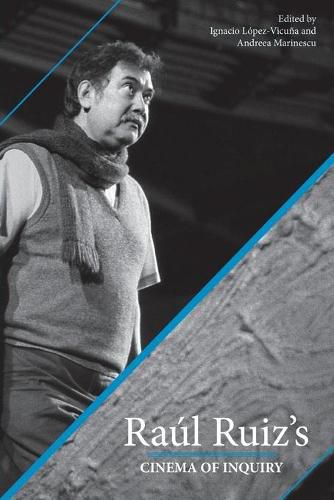Readings Newsletter
Become a Readings Member to make your shopping experience even easier.
Sign in or sign up for free!
You’re not far away from qualifying for FREE standard shipping within Australia
You’ve qualified for FREE standard shipping within Australia
The cart is loading…






This title is printed to order. This book may have been self-published. If so, we cannot guarantee the quality of the content. In the main most books will have gone through the editing process however some may not. We therefore suggest that you be aware of this before ordering this book. If in doubt check either the author or publisher’s details as we are unable to accept any returns unless they are faulty. Please contact us if you have any questions.
Investigates the work of global filmmaker Raul Ruiz.
Most widely known for his filmic productions, Raul Ruiz (1941-2011) was a highly prolific, erudite, and innovative artist, whose work is located at the intersection of diverse locations, languages, and aesthetic traditions. Ruiz’s eclectic body of work includes over one hundred films (among them features, shorts, television serials, and videos), books on the theory of cinema, genre-defying fiction books, plays, a radio show, and a multimedia installation. Raul Ruiz’s Cinema of Inquiry posits the unity of Ruiz’s body of work and investigates the similarities between his very diverse artistic productions. Ruiz’s own concept of
cinema of inquiry
provides the lens through which his films and poetics are examined.
Ruiz’s relevance to cinema and the growing interest in his work are due to his legacy as a global filmmaker. Viewers, filmmakers, and film scholars continue to return to his works because his films consistently pose the question of what cinema can be, especially at a time when cinema is increasingly seen as displaced by television and new media. Ruiz expanded the domain of cinema itself, incessantly probing the interstices between cinema and other arts. Editors Ignacio Lopez-Vicuna and Andreea Marinescu, with six other scholars, explore different aspects of Ruiz’s work, with special attention paid to the transnational aspects of Ruiz’s films, critical regionalism, and political and aesthetic interventions. Raul Ruiz’s Cinema of Inquiry includes close readings of important yet understudied films, as well as two extensive previously unpublished interviews with Ruiz. Students and scholars of film and media studies will find great value in this collection.
$9.00 standard shipping within Australia
FREE standard shipping within Australia for orders over $100.00
Express & International shipping calculated at checkout
This title is printed to order. This book may have been self-published. If so, we cannot guarantee the quality of the content. In the main most books will have gone through the editing process however some may not. We therefore suggest that you be aware of this before ordering this book. If in doubt check either the author or publisher’s details as we are unable to accept any returns unless they are faulty. Please contact us if you have any questions.
Investigates the work of global filmmaker Raul Ruiz.
Most widely known for his filmic productions, Raul Ruiz (1941-2011) was a highly prolific, erudite, and innovative artist, whose work is located at the intersection of diverse locations, languages, and aesthetic traditions. Ruiz’s eclectic body of work includes over one hundred films (among them features, shorts, television serials, and videos), books on the theory of cinema, genre-defying fiction books, plays, a radio show, and a multimedia installation. Raul Ruiz’s Cinema of Inquiry posits the unity of Ruiz’s body of work and investigates the similarities between his very diverse artistic productions. Ruiz’s own concept of
cinema of inquiry
provides the lens through which his films and poetics are examined.
Ruiz’s relevance to cinema and the growing interest in his work are due to his legacy as a global filmmaker. Viewers, filmmakers, and film scholars continue to return to his works because his films consistently pose the question of what cinema can be, especially at a time when cinema is increasingly seen as displaced by television and new media. Ruiz expanded the domain of cinema itself, incessantly probing the interstices between cinema and other arts. Editors Ignacio Lopez-Vicuna and Andreea Marinescu, with six other scholars, explore different aspects of Ruiz’s work, with special attention paid to the transnational aspects of Ruiz’s films, critical regionalism, and political and aesthetic interventions. Raul Ruiz’s Cinema of Inquiry includes close readings of important yet understudied films, as well as two extensive previously unpublished interviews with Ruiz. Students and scholars of film and media studies will find great value in this collection.